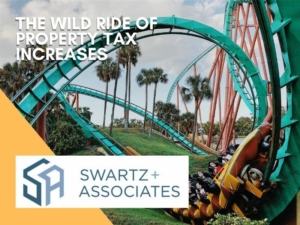The Swartz Report: The wild ride of property tax increases is in full force.
 Happy belated Valentine’s Day to everyone! I hope your Super Bowl weekend and lead in to the 14th was filled with sweet chocolates and parties for the Big Game. As a longtime Chiefs fan, I must admit to not having my “heart” in the game. Still reeling from the second half collapse against the Bengals, the game didn’t have much attraction for me and I feel like a… a… Patriots fan??? How did I become one of them so quickly? It was only a few years ago, we were at the bottom of the well, looking like we would never see the light of day. And now, a casual attitude to historically one of the more enjoyable weekends. But I digress…
Happy belated Valentine’s Day to everyone! I hope your Super Bowl weekend and lead in to the 14th was filled with sweet chocolates and parties for the Big Game. As a longtime Chiefs fan, I must admit to not having my “heart” in the game. Still reeling from the second half collapse against the Bengals, the game didn’t have much attraction for me and I feel like a… a… Patriots fan??? How did I become one of them so quickly? It was only a few years ago, we were at the bottom of the well, looking like we would never see the light of day. And now, a casual attitude to historically one of the more enjoyable weekends. But I digress…
Quantitative Easing
I recently watched an interview with Christopher Leonard, author of The Lords of Easy Money: How the Federal Reserve Broke the American Economy. I found his comments extremely interesting about what sort of effect the concept of Quantitative Easing will have long term on the real estate market as well as the valuation of equipment owned by manufacturing companies.
Generally, the idea revolves around the Federal Reserve creating money to de-value the dollar; create cheaper debt and increase asset prices. As the author describes with so much money available, it becomes necessary for money to find a home to make more money, or in Leonard’s words, “Searching for Yield”. We’ve seen this as the residential real estate market continues to push upward; commercial development continues at a blistering pace and those with money to invest are turning to real estate opportunities.
Increasing Valuations
Certainly, the assessor’s offices around the country have been taking notice as valuations have increased in many jurisdictions by 30% and even higher. It’s a difficult argument when sales of commercial properties support these increases and lower capitalization rates drive the value of income producing properties upward.
As an example, if a typical investor were looking for an 8% yield on a property that is achieving net operating income (exclusive of debt service, depreciation and amortization) of $100,000, it is fair to assume the value of the property is around $1,250,000 ($100,000/.08). Suppose another investor looks at the same property, creating the same NOI but this investor is willing to achieve a 5.5% return on the investment. Nothing about the property has changed – the income generated and the expenses are the same, however the anticipated yield has dropped to 5.5%. This creates an increase in the value of the property to over $1,800,000 ($100,000/.055). The fundamentals of the income producing property are identical, but the lower yield creates a valuation increase of $550,000.
Important Questions
Can current owners raise their lease rates? Can they pass the tax increases along to their tenants? And if so, what are the prospects of a tenant remaining in place once their lease expires? The COVID-19 world has created a significant amount of available space in the commercial markets as the hybrid working environment may have a permanent place in society. What sort of long-term effect will this have in the commercial real estate world? All are good questions and subject to consideration as the new valuations on properties are being issued over the next 30-60 days.
Hold on to your hats – the wild ride of property tax increases is in full force. As always, you may reach me directly or to discuss your portfolio.
We welcome the opportunity to assist you!



Leave a Reply
Want to join the discussion?Feel free to contribute!